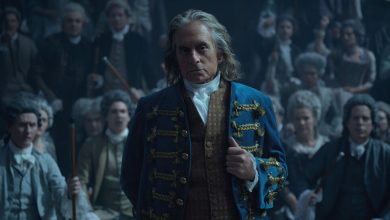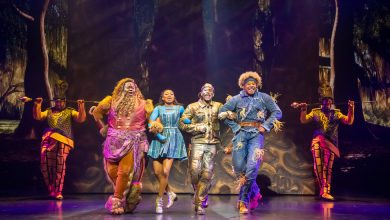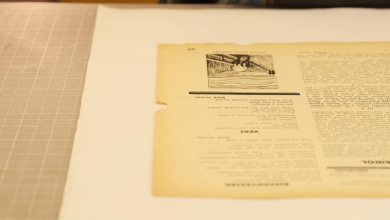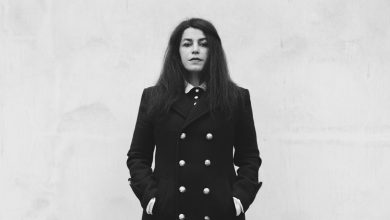Pamela Adlon Wanted ‘Better Things’ to End With a ‘Sense of Hope’

“I like where I am,” Sam Fox says during the final episode of “Better Things,” which aired on Monday. “I’m happy. I’m happy. I’m happy.”
If you love “Better Things,” a comedy that ran for five delirious seasons on FX, Sam’s contentment is bittersweet. Sweet because we leave her in such a good place. Bitter in that we have to leave her at all.
Created by Pamela Adlon and Louis C.K., the show stars Adlon as Sam, a working actress and single mother navigating a ruthless business and an exhausting home life. That life includes three children — Max (Mikey Madison), Frankie (Hannah Riley) and Duke (Olivia Edwards) — and across the street, Sam’s exacting mother, Phil (Celia Imrie). Adlon wrote or co-wrote about half of the episodes. Since Season 2, she has directed all of them.
Adlon, who was when the show began a mid-list actress and voice-over artist (“King of the Hill,” “Californication”), also has three children. And a demanding mother. “I used to say that FX was paying for my therapy,” she said. “It was an incredible thing to go to work and have all of these people listen to me. Then I would go home and nobody would listen to me.”
After two seasons, the show parted ways with Louis C.K., who admitted to sexual misconduct. Adlon stepped up, hiring a writers’ room. And “Better Things” kept going, fructifying into a closely observed and deeply felt portrait of one woman’s over-full life. As James Poniewozik wrote in The New York Times in February: “Few shows on TV have funneled as much complicated feeling through a camera lens as ‘Better Things.’ And the terrific final season lets you have it at full blast.”
Making that final season took some effort. Covid-19 delays meant that some crew members weren’t available, and pandemic protocols prevented Imrie from traveling from her London home to Los Angeles. (Imrie doesn’t fly, and boats were not available.) So Phil’s house was rebuilt on a West London soundstage, and the main cast — plus a shipping container of costumes and props — traveled there to shoot all of her scenes.
“It was the coolest,” Adlon said. She was speaking, via video call, from her Southern California production office, a few weeks before the finale aired. As she wandered through the writers’ room, the sitting room and the kitchen, pausing to rub some cream into her elbow, she spoke — in her shatterproof voice — about how the show had changed, how she had changed and why everything ends with a song. These are edited excerpts from the conversation.
When did you know that this would be the last season?
It was never not going to be the last season. I never knew that I was going to make a Season 2 or 3 or 4 or 5. But before I started this season, the decision was made. When I was having the conversation about it, with my agent and the network, I had such a stomachache. By the end of the conversation, I was excited. It changed the intention, and it really grounded me. Because I wanted to go out with a beautiful bang.
In what sense?
I wanted everybody to be whole and healthy. I wanted a win for Duke, and a win for Max, and a win for Frankie and a win for Phil. And obviously a win for Sam, but not a win that you would expect. After all everybody went through in terms of the shutdown and the world, I really wanted to leave people with a sense of hope that they could do better and be more to each other.
There seemed to be an emphasis in this season on death and rebirth. In the first episode, the statue at the top of the stairs — a constant throughout the series — smashes. And in the final episode it is replaced with something new.
You got it. At first, I thought I was going to start with the house being on fire. But I used the beanie boy statue, symbolically. So that set the tone. I’m going to cry — yeah, there we go. There’s the feeling.
The show draws heavily from your life, but are there ways in which you are different from Sam?
I mean, she’s fundamentally me. I can’t deny it. She’s the best parts of me. And when I put something in the show, it makes me a better person. I always say that Sam is like me in a cape.
How did you strike the balance between realism and more issue-driven themes, like single motherhood and women’s health and aging?
I like it all to have the same value. We’re talking about menopause, we’re talking about death — life and death. You start the whole season with Marion [Kevin Pollak] and Sam finding out about these secrets in their family. Then you see Phil, and you realize that her brother died. Either you make the whole episode about it, or you put it as a little detail. So that’s “Better Things.”
Do you feel that the show changed after the second season, once Louis C.K. was no longer a part of it?
My whole show has been about scorched earth and rising up out of that. It’s about resilience. The switch from 2 to 3 was a big one. Yeah.
The first seasons focused more on Sam’s love life and then that seemed to fall away.
That’s one of the things I was clear to the network about. I was like, “It’s not this dirty single mom trying to get some.” It was not about that. I remember when I was doing press for Season 2 or Season 3, people were like, “Is Sam going to get back with Mel Trueblood [Lenny Kravitz]? Is Sam going to get back with Robin [Henry Thomas]?” And I’m like, Wow, people really need Sam to hook up. The revolutionary act was finishing the show and everybody’s booed up except Sam. But Sam’s got her whip. She rides off into a meteor shower, and she’s happy.
Do you feel that Sam changed over the course of the show?
I feel like she definitely did.
Where do we see that in the last season? When she turns down acting work to move into directing?
It’s partially what happened for me, making my show. I had to say no to things. There were very tantalizing opportunities for me. And at a certain point, I had to say: “I have to focus on this. If I don’t do this right now, it’s never going to happen.” So I had to make sacrifices. Now I’m on the other side, and I have five seasons of a show under my belt. I did that.
So the show changed you, too.
My moon and my sun still set on my kids and my mom. They’re everything to me, and they have all the power — I guess I’m just a codependent person. But it’s different. My production company is a significant thing now, and I have this beautiful body of work. I’m a boss now; I wasn’t a boss before. I just want to keep working.
What do your own daughters think about the show?
They feel like it’s very personal. But also, they are incredibly proud. I tried to start the show away from my life. I realized that wasn’t going to work. My dad always said, “Write what you know,” so I can’t feel any shame that I’ve co-opted my daughters’ lives. As a matter of fact, I feel like I gave them a voice and their friends a voice. It’s my love letter to them.
The season begins with a musical number, Monty Python’s “Galaxy Song.” And it ends with a group sing of Monty Python’s “Always Look on the Bright Side of Life.” Why?
I love “Galaxy Song.” That was my way of addressing, like, What the [expletive] did we just go through? And then it’s just to leave everybody with “Always Look on the Bright Side of Life.” That’s really the whole motto of this show: Life is funny, and we can’t stop living because things are awful. So I just thought, This is the village. And I want to see the village singing this song.



